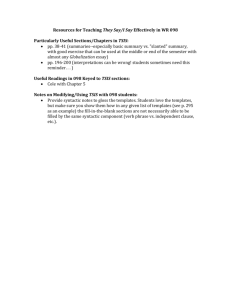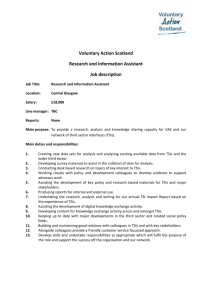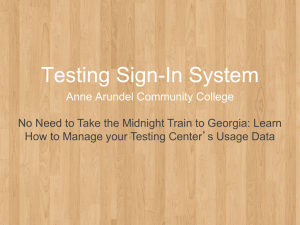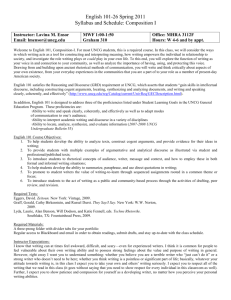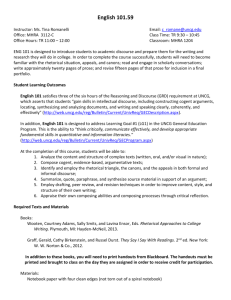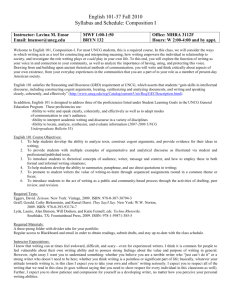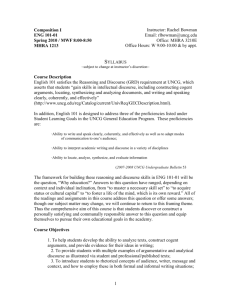EN 1103/Sec 13
advertisement
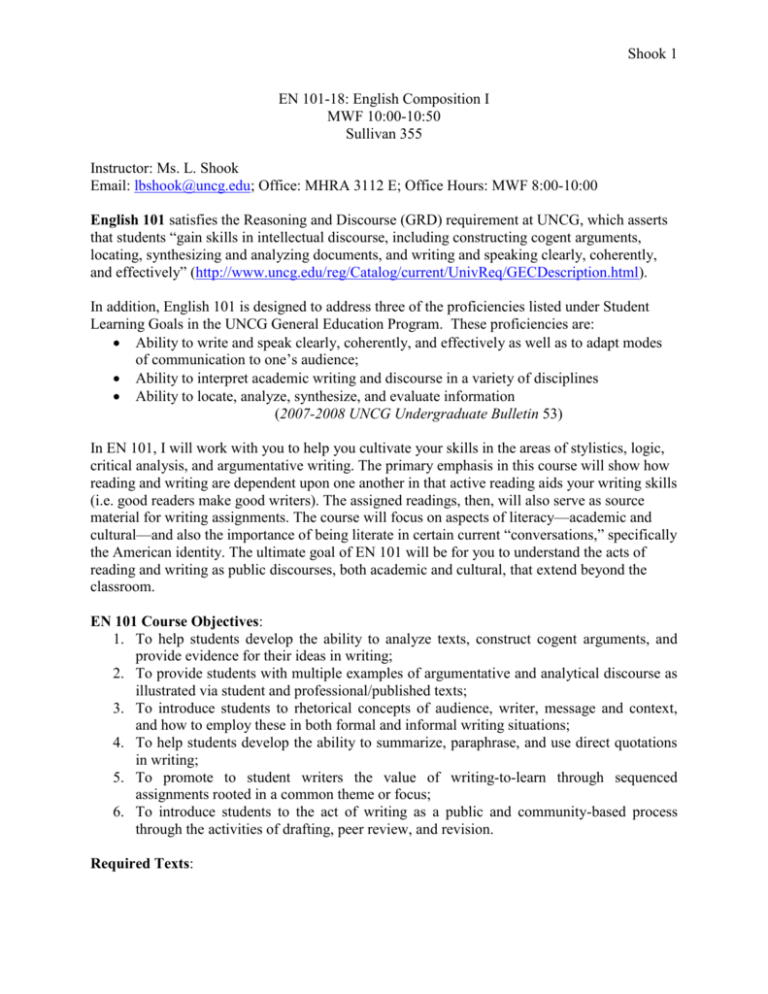
Shook 1 EN 101-18: English Composition I MWF 10:00-10:50 Sullivan 355 Instructor: Ms. L. Shook Email: lbshook@uncg.edu; Office: MHRA 3112 E; Office Hours: MWF 8:00-10:00 English 101 satisfies the Reasoning and Discourse (GRD) requirement at UNCG, which asserts that students “gain skills in intellectual discourse, including constructing cogent arguments, locating, synthesizing and analyzing documents, and writing and speaking clearly, coherently, and effectively” (http://www.uncg.edu/reg/Catalog/current/UnivReq/GECDescription.html). In addition, English 101 is designed to address three of the proficiencies listed under Student Learning Goals in the UNCG General Education Program. These proficiencies are: Ability to write and speak clearly, coherently, and effectively as well as to adapt modes of communication to one’s audience; Ability to interpret academic writing and discourse in a variety of disciplines Ability to locate, analyze, synthesize, and evaluate information (2007-2008 UNCG Undergraduate Bulletin 53) In EN 101, I will work with you to help you cultivate your skills in the areas of stylistics, logic, critical analysis, and argumentative writing. The primary emphasis in this course will show how reading and writing are dependent upon one another in that active reading aids your writing skills (i.e. good readers make good writers). The assigned readings, then, will also serve as source material for writing assignments. The course will focus on aspects of literacy—academic and cultural—and also the importance of being literate in certain current “conversations,” specifically the American identity. The ultimate goal of EN 101 will be for you to understand the acts of reading and writing as public discourses, both academic and cultural, that extend beyond the classroom. EN 101 Course Objectives: 1. To help students develop the ability to analyze texts, construct cogent arguments, and provide evidence for their ideas in writing; 2. To provide students with multiple examples of argumentative and analytical discourse as illustrated via student and professional/published texts; 3. To introduce students to rhetorical concepts of audience, writer, message and context, and how to employ these in both formal and informal writing situations; 4. To help students develop the ability to summarize, paraphrase, and use direct quotations in writing; 5. To promote to student writers the value of writing-to-learn through sequenced assignments rooted in a common theme or focus; 6. To introduce students to the act of writing as a public and community-based process through the activities of drafting, peer review, and revision. Required Texts: Shook 2 Graff, Gerald, Cathy Birkenstein, and Russel Durst. They Say I Say With Readings. New York: Norton, 2008. ISBN: 978-0-393-931747 Dodson, Will, Alan Benson, and Jacob Babb, Eds. Techne Rhetorike: Techniques of Discourse for Writers and Speakers. Southland, TX: Fountainhead Press, 2010. 978-1-59871-385-5 Eggers, Dave. Zeitoun. New York: Random House, 2010. ISBN: 978-0-307-38794-3 Note: Readings will be posted also on Blackboard (BB). You should print these off and bring them to class. Evaluation: Portfolio Essay Drafts Informal Writing / RR Peer Review / Group Work Participation / RQ / HW Grading Scale: 30% 30% 20% 10% 10% A = 90-100 B = 80-89 C = 70-79 D = 60-69 F = 0-59 I recommend that you keep a list of your grades as you receive graded assignments from me so that you may be able to evaluate your class progress. This should eliminate “surprise grades” (for example: At the end of the semester, you see your final grade and are surprised that you received a D). Course Work: Over the semester, you will complete three formal essays of increasing lengths (length: 3-4 pgs; 4-6 pgs; 5-8 pgs), and each will require a first draft to be peer reviwed; four reading responses (1-2 pgs); various informal writing assignments and group work; and a final portfolio, consisting of a self-reflexive letter, two reading responses, and all revised essays, along with all accompanying drafts (more information to follow). Classroom Policies: 1. Attend Class. Come to every class meeting. You may not make up class activities such as peer review, in-class writings or exercises, and reading quizzes for any reason.**If you miss six classes, you will automatically fail the course. 2. Come to class on time. All homework (including essay drafts) is due within the first ten minutes of class. You will not receive any credit for assignments turned in after the first ten minutes of class. Likewise, all reading quizzes will be given within the first ten minutes of class; failure to be on time results in a zero. You cannot make up these grades. 3. Late essays will be penalized half a letter grade for every day they are late (weekends included). I do not accept “printer” excuses for late essays. 4. All essays must be in MLA format: handout to be posted on Blackboard. 5. Read and Engage in Class Discussion: For each class meeting, consult the syllabus for that day’s assignment(s). I expect you to read the assigned reading(s) and be prepared to discuss the reading(s). Sometimes I give reading quizzes to ensure that you have read. Additionally, you should bring the readings with you to class. 6. Classroom Behavior: In addition to being prepared for class discussion, I also ask that you Shook 3 a. Silence your cell phones and put them away, along with any other electronic devices (Ipods / mp3 players, etc.). Texting is not permitted. If I have to ask you to put away your phone or other devices more than once in a class meeting, you will be asked to leave the classroom; consequently, you will not be able to make up any of that meeting’s class work. b. Laptops may be used in class only to take notes pertaining to our class or to view documents on our Blackboard website. Any student who uses a laptop for any non-classroom activity during class time will not be allowed to use a laptop in class again. To be perfectly clear: one violation means no laptop use. c. Be respectful of others in the class. At times, we may enter into lively, controversial discussions, but “personal shots” at other students’ views will not be tolerated. 7. Emailing and Conferencing: At mid-semester and in the final week, I will hold mandatory student-teacher conferences, during which we will discuss a particular assignment, along with any additional concerns that you may have about the class. Also, please feel free to meet with me during regular office hours; if your schedule should conflict with my office hours, you may set up an appointment with me through email or just email me your concerns. For emails, I will be available from 7:00am to 7pm, and I should respond within 24 hours. If after 24 hours, I should fail to respond, please resend your email. Academic Integrity “Academic integrity is founded upon and encompasses the following five values: honesty, trust, fairness, respect, and responsibility. Violations include, for example, cheating, plagiarism, misuse of academic resources, falsification, and facilitating academic dishonesty. If knowledge is to be gained and properly evaluated, it must be pursued under conditions free from dishonesty. Deceit and misrepresentations are incompatible with the fundamental activity of this academic institution and shall not be tolerated”—UNCG’s Academic Integrity Policy. To ensure that you understand the university’s policy on academic integrity, review the guidelines and list of violations at <http://academicintegrity.uncg.edu>. I expect you to abide by the Academic Integrity Policy. The Office of Disability Services Students with documentation of special needs should arrange to see me about accommodations as soon as possible. If you believe you could benefit from such accommodations, you must first register with the Office of Disability Services on campus before such accommodations can be made. The office is located on the second floor of the Elliott University Center (EUC) in Suite 215, and the office is open 8am to 5pm, Monday-Friday. Telephone: 334-5440; email: ods@uncg.edu. The Writing Center The purpose of the Writing Center is to enhance the confidence and competence of student writers by providing free, individual assistance at any stage of any writing project. Staff consultations are experienced writers and alert readers, prepared to offer feedback and suggestions on drafts of papers, help students find answers to their questions about writing, and Shook 4 provide one-on-one instruction as needed. Location: Moore Humanities and Research Building, 3211. The Learning Center The Learning Assistance Center offers free services to the entire UNCG undergraduate community and is located in McIver Hall, rooms 101-104, and 150. For help with study skills, contact Erin Farrior, Academic Skills specialist. Telephone: 334-3878; email: lac@uncg.edu. Course Schedule Key: TR—Techne Rhetorike; TSIS—They Say / I Say; BB—Blackboard Date Week 1 8/23, M Topics 8/25, W Intro to Rhetoric 8/27, F Understanding Rhetorical Situations Week 2 8/30, M 9/1, W Readings Intro to Class Assignments In-Class Writing TR: “Introduction to Rhetorical Concepts,” Dodson (12-20) TSIS: “Entering Class Discussion” (135-37) TR: “Rhetorical Concepts,” Dodson (2023) TR: “The Response Essay,” Bowman (17075) TR: “Textual Analysis” (192-219) TSIS: “Introduction: Entering the Conversation” (1-13) BB: “The Declaration of Independence,” Jefferson BB: “Declaration of Sentiments and Resolutions,” Stanton BB: “Ain’t I a Woman,” Truth TR: “How to Read an Assignment Sheet,” Sparks (48-55) BB: Print off Paper 1 Assignment (Ad Brainstorming / Groups: Rhetorical Situations Reading Response 1— Analyze the Rhetorical Situation of one of the assigned reading Group Work— Analyzing Advertisements Shook 5 Analysis) TR: “Revision is Writing,” Mullins (7680) BB: “The Maker’s Eye: Revising Your Own Manuscript,” Murray 9/ 3, F Week 3 9/6, M 9/8, W 9/10, F Week 4 9/13, M 9/15, W 9/17, F Week 5 9/20, M Labor Day Holiday Peer Review Challenges of Academic Literacy Bring in Draft 1 of Paper 1 (PR) TR: “The Genre of Academic Discourse,” Morehead (33-39) BB: “Inventing the University,” Bartholomae TSIS: “Ain’t So / Is Not” (115-122) BB: “How to Write with Style,” Vonnegut BB: “Mother Tongue,” Tan BB: “From Outside, In,” Mellix BB: “Teaching New Worlds/New Words,” hooks BB: Print off Portfolio Assignment TR: “The Art of Annotation,” Dodson (124-30) TR: “Using MLA” (278-300) TSIS: “Reading for the Conversation” (138-48) BB: Print Annotation Assignment BB: “From Freedom to Manners,” Fox BB: “Learning to Read and Write,” Douglas BB: “The Library Paper 1 Due (Ad Analysis) Practice Annotation— In class Writing (Bring hooks’s “Teaching New Worlds/New Words”) Annotated Article Due Shook 6 9/22, W Nuts and Bolts of Research 9/24, F Week 6 9/27, M 9/29, W American Identities 10/1, F Week 7 10/4, M 10/6, W 10/8, F Week 8 10/11, M 10/13, W 10/15, F Week 9 10/18, M 10/20, W Card,” Wright TR: “Researching Rhetorically,” Benson and Lyda (112-17) TR: “Finding a Conversation to Find Research,” Wooten (118-23) BB: Bring to class Paper 2 assignment (Research Paper) TSIS: “They Say” (1547) TR: “Logical Fallacies” (220-23) TR: “Summarizing, Paraphrasing, and Quoting,” Ray BB: “Confronting Class in the Classroom,” hooks BB: “I Just Wanna be Average,” Rose BB: “The Man Who Went to Chicago,” Wright BB: “My Two Lives,” Lahiri BB: Print off Zeitoun assignment Reading Response 2— Diversity in America Library Orientation TR: “Conferencing Rhetorically,” Meriwether (180-83) Conferences Conferences Katrina and the American Identity Fall Break—No Class Zeitoun (3-81) Zeitoun (85-170) Zeitoun (173-202) Zeitoun (205-290) Group Presentations on Zeitoun Shook 7 10/22, F Zeitoun (293-325) Reading Response 3— The implications of Katrina for American Identities Week 10 10/25, M Peer Review Bring in Draft 1 of Paper 2 (PR) 10/27, W 10/29, F Peer Review TSIS: “I Say” (49-73) TR: “Theses, Claims, and Arguments” (22452) Week 11 11/1, M TSIS: “I Say” (74-97) BB: Bring in Paper 3 Assignment (Argument) TSIS: “As a Result: Connecting the Parts” (101-14) ACR Conference TSIS: “In Other Words: The Art of Metacommentary” (123-32) 11/3, W 11/5, F Week 12 11/8, M TR: “The Portfolio Process,” Ray (184-89) Bring Portfolio Assignment Peer Review 11/10, W 11/12, F Week 13 11/15, M 11/17, W Cultural Literacy Paper 2 Due (Research) Bring in Draft 1 of Paper 3 (PR) TSIS: “Hidden Intellectualism,” Graff (297-304) TSIS: “Watching TV Makes You Smarter,” Johnson (213-30) TSIS: “Thinking Outside the Idiot Box,” Stevens (231-35) BB: “Gangsta Rap and American Culture,” Dyson BB: “Gangsta Culture,” bell hooks Reading Response 4— Responding to the Johnson / Stevens Debate Paper 3 Due (Argument) Shook 8 11/19, F Week 14 11/22, M 11/24, W 11/26, F Week 15 11/29, M Group Presentations 12/1, W 12/3, F Week 16 12/6, M (Last day of classes) Conferences Conferences Group Presentations Thanksgiving Break Thanksgiving Break Portfolio Workshop Evaluations Bring Draft of SelfReflexive Letter Submit Portfolio Final Exam: Wednesday, Dec 8. 12:00 noon-3:00 pm. While there will be no final exam, class will meet so that I can hand back your portfolios. I will not return portfolios earlier or later than the exam day. You must be in class during the scheduled final exam time. Failure to show up for class will count for an absence, which could affect your overall grade or determine if you will pass the course, depending on your previous absences (see attendance policy).
